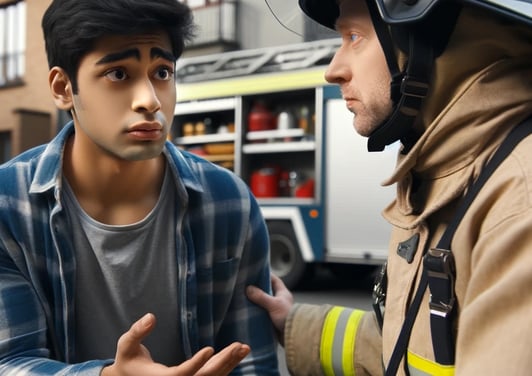Liars (Part 2)
Ugly and Dangerous Little Lies


Last week, I wrote about those “beautiful lies” a chaplain may hear that don't seem so bad. These are the lies we may hear when someone remembers a loved one who has died. This week, I wish to share about those “ugly and dangerous little lies" – especially the ones that have safety implications for a chaplain and others involved in the incident.
My former Battalion Chief used to get on me for ignoring the noticeable particulars right before me. When I started working with a structure fire department, I would miss the obvious facts of drug use, illegal activity, or “jacked-up” people. I like to think back then that I still wanted to see the best in people. But, most likely, it was because I was just too naïve.
There are times when lying can be a problem. As chaplains, we are not investigators; we are observers and witnesses to the emergency events that unfold around us. This means we can be a witness to bad or illegal and threatening events. This can make our jobs more complex. As chaplains, we sometimes walk the fine line between priest/penitent and being mandatory reporters regarding what we see, what we are being told, and ultimately, what we can and should say.
When is it a problem when somebody doesn't tell us the truth, and how do we know? Much of this comes from experience and keeping your head on a swivel. Being situationally aware takes time; it has to be learned and practiced. Being aware of a person's body language may also give us a deeper awareness of the scene and possible crimes that may have been committed.
Joe Navarro, a former FBI agent, wrote a book in 2008 entitled What Every Body is Saying. In it, he writes about nonverbal behavior and how to speed-read people. Specifically:
"Becoming aware of the world around you is not a passive act. It is a conscious, deliberate behavior - something that takes effort, energy, and concentration to achieve, and contestant practice to maintain."
Remember, you are not an investigator but an observer. With that, here are some things to look for:
Observe the scene. Learn to be a competent observer of your environment. Does it match what was presented to you by dispatch or other first responders?
As you enter the room, look for any illegal activity or weapons. Are they secure? Are other first responders aware of these items?
Who is in the room? Observe who is in the room, where they are located, and their demeanor. Someone sitting relaxed at a table tells us something quite different than one who is anxious and pacing. You may not know a person's normal behavior, but multiple clues will help you better understand this person.
Does the body language of the person you are talking with say they want to leave or not want to talk with you? While I could detail all the signs, most of us could get the major ones if we were aware. Remember to watch their feet. While people can lie with their mouths and facial expressions, they rarely lie with their feet and hip placement.
Is the story clear? Does it match the scene? Are you noticing inconsistencies with what you are being told? Are little "red flags" going up in your mind?
People will "bend the truth" or lie outright to protect themselves or someone they love. Can you accept that you are being told lies? It doesn't matter if you are the chaplain, a police officer, a firefighter, or an EMT - being aware of the scene can help provide a powerful clue to when we are being told those unwanted and ugly little lies. And yes, Chaplain, you will be lied to.
